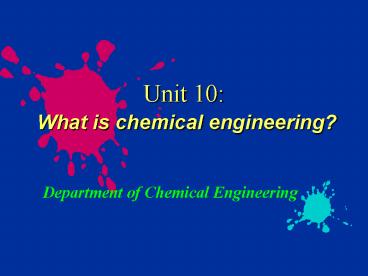Unit 10: What is chemical engineering? - PowerPoint PPT Presentation
1 / 22
Title:
Unit 10: What is chemical engineering?
Description:
... process flow separation and by-product use of energy evolution of technical economy Job opportunities and Industries ... Food & drink Oil & gas ... Nanotechnology ... – PowerPoint PPT presentation
Number of Views:164
Avg rating:3.0/5.0
Title: Unit 10: What is chemical engineering?
1
Unit 10 What is chemical engineering?
- Department of Chemical Engineering
2
? Four questions
- I. What is Chemical Engineering?
- II. What are the differences between Chemical
Engineering and Chemical technology? - III. Can you list some core courses of chemical
engineering? - VI. What are the future trends in chemical
engineering?
3
Products
Raw Materials
Processes
4
Definition of Chemical Engineering
- In its simplest form, chemical engineering is
the design, development and management of a wide
and varied spectrum of industrial processes. - IChemE definition, 2005
5
Definition from our textbook
- Thus, chemical engineering is that branch of
engineering which is concerned with the study of
the design, manufacture, and operation of plant
and machinery in industrial chemical processes. - ? How to make a definition?
6
Main subjects of chemical technology
- ?material and pre-trement
- ? routine of production
- ? equipment and accessory
- ? catalyst
- ? effect of other material on the process
- ? operating condition
- ? process flow
- ? separation and by-product
- ? use of energy
- ? evolution of technical economy
7
Job opportunities and Industries(1)
- Chemical engineering are employed across a huge
variety of sector including - Chemical and allied products
- Pharmaceuticals
- Energy
- Water
- Food drink
- Oil gas
- Process plants equipment
- Biotechnology
- Business and management
- Consultancy
8
Job opportunities and Industries(2)
- Chemical engineers are, on average, the highest
paid of the "Big Four". Additionally, many
chemical engineers have found their way into
upper management.
9
Jobs in foreign countries
- A chemical engineer is either currently, or has
previously, occupied the CEO position for 3M, Du
Pont, General Electric, Union Carbide, Dow
Chemical, Exxon, BASF, Gulf Oil, Texaco, and B.F.
Goodrich. Even a former director of the CIA, John
M. Deutch, was a chemical engineer by training.
10
Jobs in China
- Chemicals, electronics, petroleum refining,
paper, and related industries - Professional, scientific, or technical
services/firms/university that design chemical
plants or perform RD for chemical companies.
11
Core curriculum
- More typically, chemical engineers concern
themselves with the chemical processes that turn
raw materials into valuable products. The
necessary skills encompass all aspects of design,
testing, scale-up, operation, control, and
optimization, and require a detailed
understanding of the various "unit operations",
such as distillation, mixing, and biological
processes, which make these conversions possible.
12
- Chemical engineering science utilizes mass,
momentum, and energy transfer along with
thermodynamics and chemical kinetics to analyze
and improve on these "unit operations."
13
Chemical Engineering Today Tomorrow
- The "Big Four" engineering fields consist of
civil, mechanical, electrical, and chemical
engineers. Of these, chemical engineers are
numerically the smallest group. However, this
relatively small group holds a very prominent
position in many industries.
14
Future of Chemical Engineering
- In the past, chemical engineering has focused on
large scale, low value chemical processes e.g.
minerals, oil and gas, chemicals. - Increasingly, high value molecular engineering is
giving sophisticated products spawning a new
molecular - engineering industry.
15
Biotechnology
- Molecular design of bio-products, tissue
engineering etc. - Research at the interface between health,
biotechnology and engineering. - Constructing a pilot-scale facility for the
production of biomolecules.
16
Nanotechnology
- ?Creating products bottom-up using
nano-assembly methods. - ?Synthesis of novel nanoporous carbon materials
for membranes and catalysts. - ?Self assembly of colloidal nanomaterials.
- ? Synthesis of nanostructured carbons for
hydrogen storage. - ?Fluidisation and reaction kinetics in beds of
nanoparticles.
17
Nanotechnology-example
- ?Carbon nano-tubes extremely strong,
lightweight. - Diameter 1.2-1.5nm
- 10,000 times stronger than steel
- ?Applications
- Strengthen structures
- Electronic/optical
- Hydrogen storage
- Space elevator?
18
Environment
- Increasing environmental awareness is creating
new opportunities in the energy and
sustainability industries.
19
Future of Chemical Engineering -Examples
- Hydrogen fuel
- 500 km on 4kg of H2
- Only product of combustion is water
- Methanol Fuel Cells
- Mobile phone battery will last 6 months
- 2 weeks power for a laptop!
20
Note
- ?Chemical engineering is not a profession that
has to dwell on the achievements of the past for
comfort, for its greatest accomplishments are yet
to come.
21
That is to say, you are the future of chemical
engineering.
22
So if you want to be successful you must study
hard!































